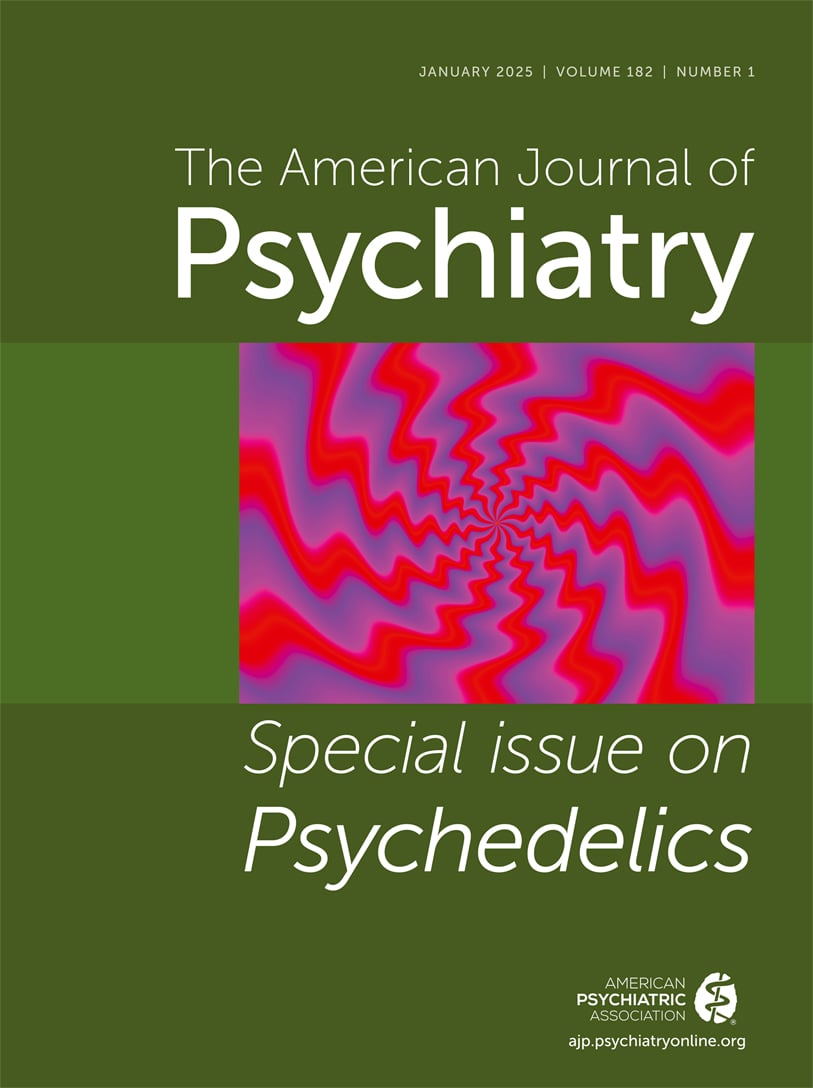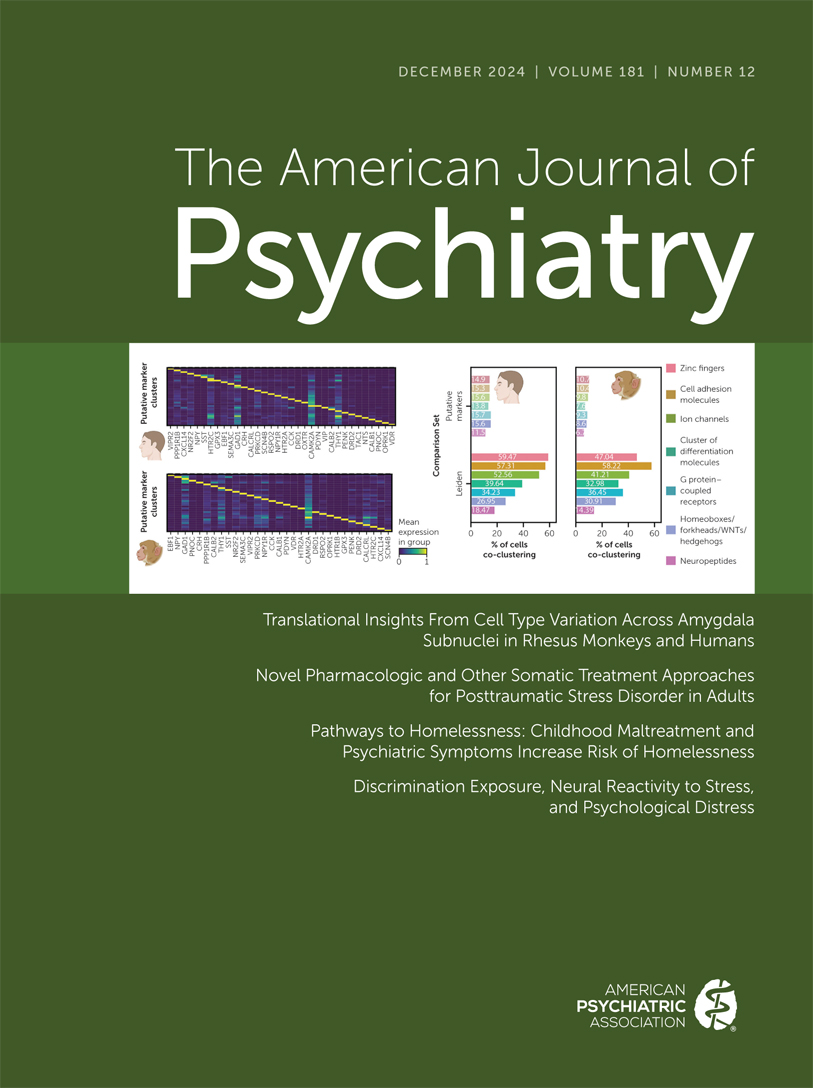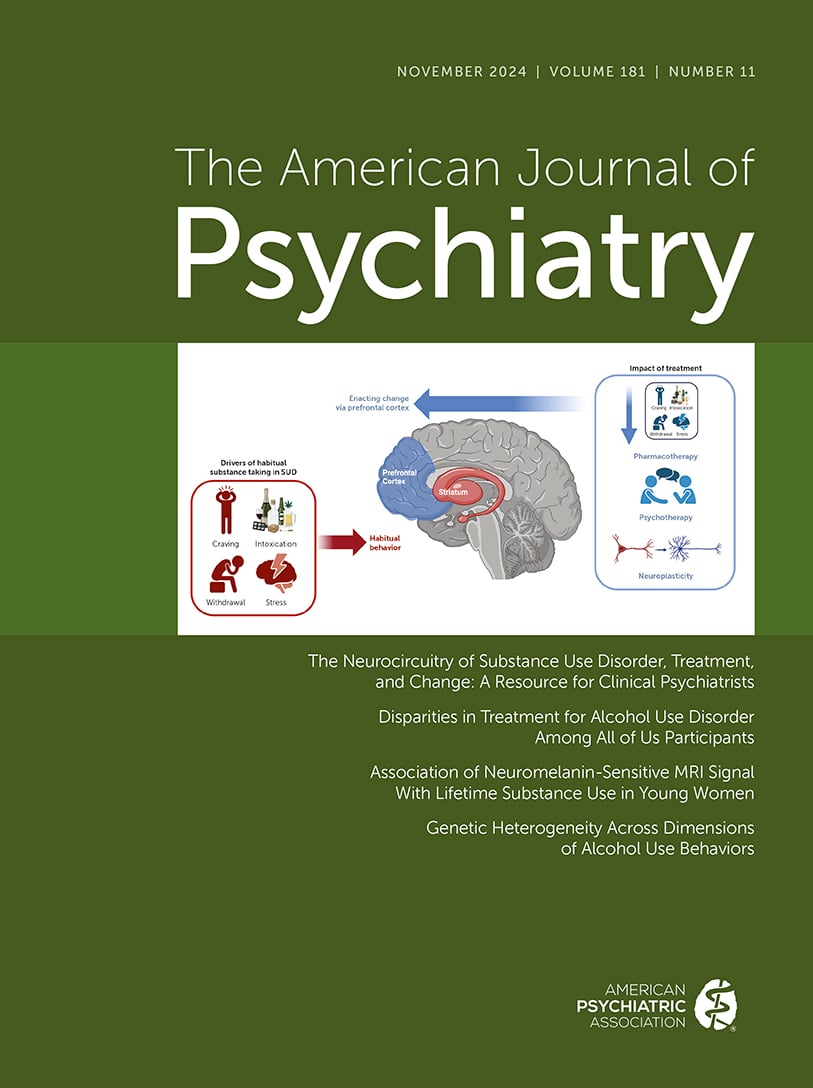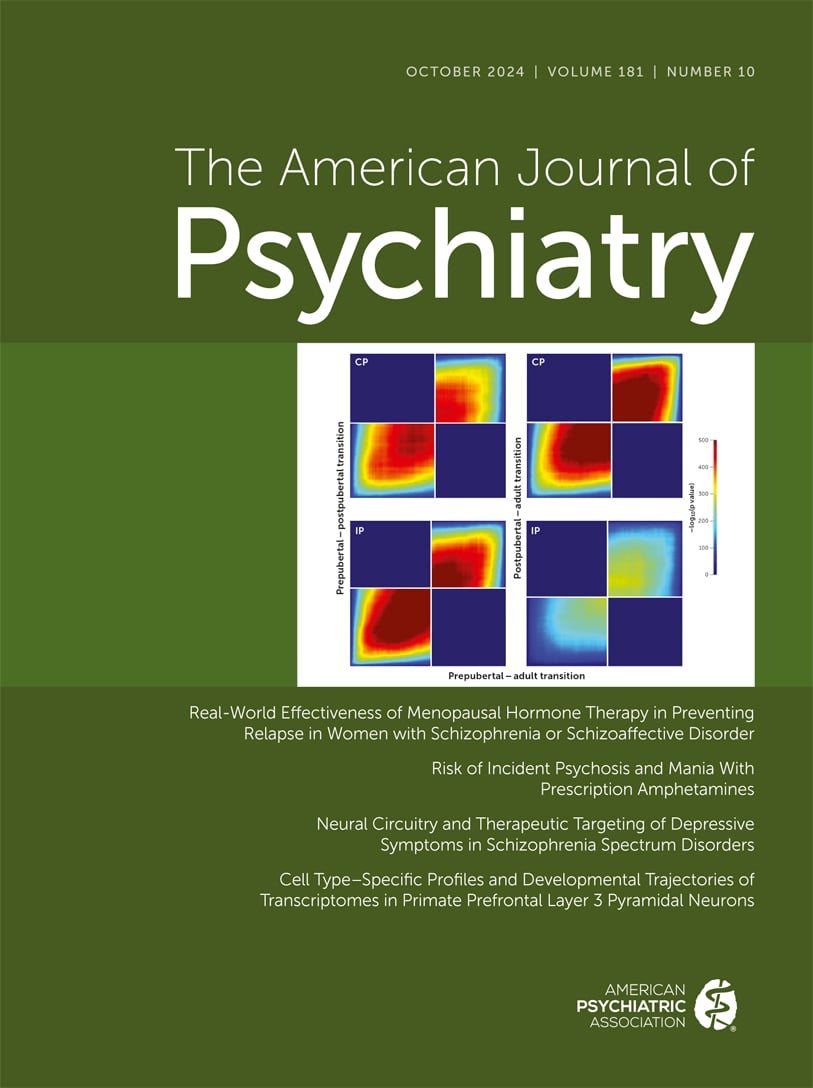American Journal of Psychiatry
- Volume 125
- Number 3
- September 1968
Article
Publication date: 01 September 1968
Pages281–285The author gives a historical review of three main types of violence in the U. S. and their social and psychological causes. He feels that we have been more willing to settle for violence than to attend to the social conflicts which generate it. Using an ...
https://doi.org/10.1176/ajp.125.3.281Publication date: 01 September 1968
Pages286–293The author describes a procedure whereby, following a ward meeting or group therapy session, the staff holds its professional conference—including treatment planning—in the presence of the patients. If certain rules (which he lists) are followed and each ...
https://doi.org/10.1176/ajp.125.3.286Publication date: 01 September 1968
Pages294–304The relative merits of bilateral and unilateral electroconvulsive therapy in the treatment of depressed patients were investigated in a double-blind clinical comparison. Although most patients who received the unilateral mode of treatment experienced ...
https://doi.org/10.1176/ajp.125.3.294Publication date: 01 September 1968
Pages305–312The authors review the diagnosis of simple schizophrenia, using as source material classical and contemporary textbook descriptions, a statistical survey, and case studies. The evidence demonstrates no typical premorbid history, no standard time of onset, ...
https://doi.org/10.1176/ajp.125.3.305Publication date: 01 September 1968
Pages313–319The author relates Freud's theory of the unconscious to that of Descartes and compares both to C. S. Peirce's doctrine of "contrite fallibilism," which held that no knowledge is direct and intuitive—that all knowledge is subject to error. The author ...
https://doi.org/10.1176/ajp.125.3.313Publication date: 01 September 1968
Pages320–326Tybamate was evaluated in a controlled, double-blind study conducted with 126 anxious neurotic patients seen in general practice. Tybamate produced significantly more improvement than placebo only at the final four-week evaluation. The largest tybamate-...
https://doi.org/10.1176/ajp.125.3.320Publication date: 01 September 1968
Pages327–332On the basis of his own experience and the reports of other therapists, this author concludes that group therapy is a sound approach to the treatment of sexual maladjustment. The group provides realistic and constructive criticism for each of its members, ...
https://doi.org/10.1176/ajp.125.3.327Publication date: 01 September 1968
Pages333–340This analysis of over 17,000 first admissions to psychiatric hospitals in Norway during the period 1936 to 1958 is based upon three separate four-year cohorts of patients admitted for psychoses. The data do not support the theory that the current rising ...
https://doi.org/10.1176/ajp.125.3.333Publication date: 01 September 1968
Pages341–351Twenty-one paid volunteers who were chronic users of LSD were interviewed and participated in a series of cognitive and perceptual tests and EEG studies. Among other observations derived from both interviews and testing, the authors noted that the group ...
https://doi.org/10.1176/ajp.125.3.341Publication date: 01 September 1968
Pages352–357The authors surveyed a sample of psychiatrists, psychiatric residents, internists, general practitioners, and psychologists in Los Angeles County to determine the number of patients with adverse LSD reactions seen by these professionals during an 18-month ...
https://doi.org/10.1176/ajp.125.3.352Publication date: 01 September 1968
Pages357–364DOM, a hallucinogen related to mescaline and amphetamine and designated "STP" by hippies, along with DOET, the ethyl homologue of DOM, were given in small doses to normal subjects in a double-blind study. Both drugs increased self-awareness and produced ...
https://doi.org/10.1176/ajp.125.3.357Publication date: 01 September 1968
Pages364–370The role of marihuana and LSD is crucial in the hippie rebellion. Drugs provide a social ritual, a focus of guiltless lawbreaking, and an effective medication to relieve undesired feelings of anger and aggression. The future of the hippies and their ...
https://doi.org/10.1176/ajp.125.3.364Publication date: 01 September 1968
Pages370–378Current knowledge of the use of marihuana, its physical and mental effects, and its relation to crime and to other drug use are reviewed. The authors feel that a reappraisal of the social and legal policies regarding marihuana use is needed to resolve the ...
https://doi.org/10.1176/ajp.125.3.370Publication date: 01 September 1968
Pages379–384The study reported here, designed to extend knowledge of the behavioral toxicity of marihuana, illustrates some of the problems involved in measuring the effects of such drugs. A number of performance tests proved insensitive to marihuana in the doses ...
https://doi.org/10.1176/ajp.125.3.379Publication date: 01 September 1968
Pages384–386Four individuals reported the recurrence, in a drug-free state, of unusual visual or somatic sensations previously experienced during marihuana reaction. None had used other hallucinogens. Two of the four were distressed by these recurrences. Such events ...
https://doi.org/10.1176/ajp.125.3.384Publication date: 01 September 1968
Pages386–390Curiosity and conformity were cited as the principal reasons for initial marihuana use by 54 users interviewed. Twenty-six of the 40 who became regular users sought an experience combining tension relief with mild stimulation of thought. Fourteen of the ...
https://doi.org/10.1176/ajp.125.3.386Publication date: 01 September 1968
Pages395–396A computer program to convert automated hospital and patient records from DSM-I diagnostic categories to those used in DSM-II has been developed; program listings are available on request from the authors. Since some diagnostic categories are not directly ...
https://doi.org/10.1176/ajp.125.3.395Publication date: 01 September 1968
Pages397–398The use of EST on two depressed patients with unusual medical complications is reviewed. The author concludes that this therapy should not be used when a diagnosis of hyperkaliemia and periodic paralysis is made. However, EST is judged safe for elderly ...
https://doi.org/10.1176/ajp.125.3.397Publication date: 01 September 1968
Pages399–401Depersonalization in conjunction with self-destructive behavior is more common than generally realized. Suicide attempts are often carried out while the individual is in a depersonalized state. As a result of ego-splitting there is partial withdrawal from ...
https://doi.org/10.1176/ajp.125.3.399Publication date: 01 September 1968
Page404On page 1702 of the June issue, the third paragraph of the article "Lithium in Manic-Depressive Illness," by R. J. Kerry, M.R.C.S., L.R.C.P., D.P.M., and G. Owen, M.B., M.C. Path., contains an error. The word "lithium" should be replaced by "tritium" and ...
https://doi.org/10.1176/ajp.125.3.404Past Issues
View Issues Archive
Vol. 182 | No. 1

Vol. 181 | No. 12

Vol. 181 | No. 11
